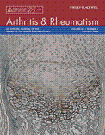Requirement of transforming growth factor β–activated kinase 1 for transforming growth factor β–induced α-smooth muscle actin expression and extracellular matrix contraction in fibroblasts
Abstract
Objective
Fibrosis is believed to occur through normal tissue remodeling failing to terminate. Tissue repair intimately involves the ability of fibroblasts to contract extracellular matrix (ECM), and enhanced ECM contraction is a hallmark of fibrotic cells in various conditions, including scleroderma. Some fibrogenic transcriptional responses to transforming growth factor β (TGFβ), including α-smooth muscle actin (α-SMA) expression and ECM contraction, require focal adhesion kinase/Src (FAK/Src). The present study was undertaken to assess whether TGFβ-activated kinase 1 (TAK1) acts downstream of FAK/Src to mediate fibrogenic responses in fibroblasts.
Methods
We used microarray, real-time polymerase chain reaction, Western blot, and collagen gel contraction assays to assess the ability of wild-type and TAK1-knockout fibroblasts to respond to TGFβ1.
Results
The ability of TGF to induce TAK1 was blocked by the FAK/Src inhibitor PP2. JNK phosphorylation in response to TGFβ1 was impaired in the absence of TAK1. TGFβ could not induce matrix contraction or expression of a group of fibrotic genes, including α-SMA, in the absence of TAK1.
Conclusion
These results suggest that TAK1 operates downstream of FAK/Src in mediating fibrogenic responses and that targeting of TAK1 may be a viable antifibrotic strategy in the treatment of certain disorders, including scleroderma.



 method
method
